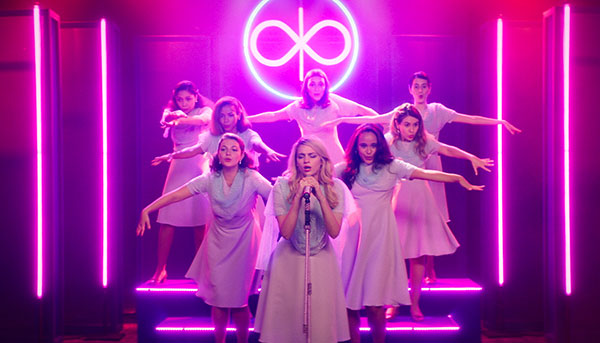Religious fanaticism and oppressive masculinity hang heavy over Anita Rocha da Silveira’s visually resplendent and thematically compelling Medusa.
Medusa might be drenched in neon and boast a pulsating, bass-driven score not out of place in a John Carpenter film, but underneath this stylish 70s surface, there is a ferocious feminist tale being told. Despite being slow to form – both thematically and narratively – and not initially being clear in its utilisation of its titular Gorgon of Greek mythology, Medusa crescendoes into a wholly satisfying and memorable film. Difficult to define, Anita Rocha da Silveira’s (Kill Me Please) second feature film is a concoction of dark utopian, thriller and sci-fi elements, with a story that eventually becomes just as mesmerising as the striking visuals.
Despite being based on Greek mythology – specifically Medusa, one of three Gorgons who had venomous snakes instead of hair and could turn people into stone – da Silveira’s film is grounded in the present day, namely contemporary Brazil. Da Silveira was inspired to write Medusa after seeing young paramilitary groups surfacing in Brazil in the 2010s, in addition to an increasing number of young men and women supporting an ultraconservative lifestyle. In the film, a group of women devote their days to religion in the form of song and dance, with performances that centre on their beauty and purity. By night, they moonlight as vigilantes, punishing other females who they see as sinners. Da Silveira’s initial portrayal of these young women as attackers makes for an interesting dynamic, before it becomes clear that they themselves are victims of an oppressive, male-dominated regime within the city.
Medusa builds around Mari (Mari Oliveira) who, after being left with a scarred cheek from an attack gone wrong, starts to see the claustrophobic, masculine world for the monster that it is. She has sex and attends dances in the woods, even taking on the look of Medusa as she lies in bed with her hair splayed out on the pillow. Gorgeous, futuristic visuals with heavy neon colours and lens flares galore form the backdrop to Mari’s world. The colour green takes on new levels of meaning, infusing both screen and Mari with anger and rebellion as repressed desire simmers just below the surface. A contemporary soundtrack and Bernardo Uzeda (Madalena) and da Silveira’s pulpy, thumping score drives Mari further along on her quest for liberation.

Within the highly stylised tone of Medusa are serious indictments of societies, both Brazilian and worldwide. Da Silveira impressively balances themes of feminism, toxic masculinity, religion and mass hysteria into something hugely potent and striking, aside from a short dip in the middle where the plot seems unsure of where to go. Lara Tremouroux’s Michele, who is Mari’s best friend and the leader of the group of women, adds another angle to proceedings, first butting heads with Mari over her noticeable change in ideology before coming to embrace the newfound freedom herself. A particularly poignant and well-handled scene sees Michele wiping makeup from her face after filming tutorial video, the concealer disappearing to unveil a black eye given to her by a controlling boyfriend. Throughout Medusa, da Silveira consistently shows a respectful and effective handling of dark elements such as this.
From the very first scene of Medusa, there is a compelling undercurrent to proceedings; a beautiful freedom can be felt lurking amidst the oppression and religious hysteria. There is a satirical humour to it too – Michele’s self-help video for how to take a Christian selfie is both amusing and unnerving – but the real power of Medusa comes in its memorable, goosebump-inducing finale. With its basis in Greek mythology and futuristic photography and lighting, Medusa is a thought-provoking concoction of the past, present and future, with male dominance and feminine fury the one constant.
Medusa is now available to watch on digital demand in the US and select countries. In the UK, the film will be released theatrically from July 14, 2023. Read our interview with Medusa’s director, Anita Rocha da Silveira.

